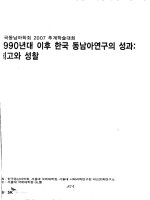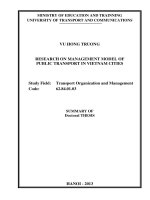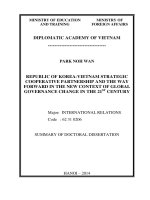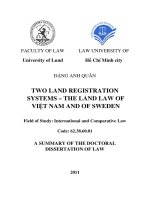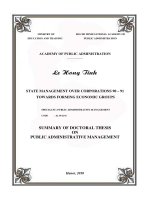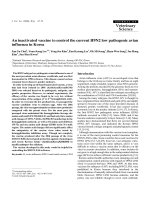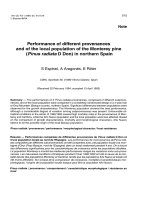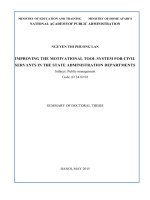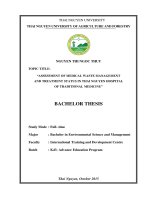Summary of Doctoral dissertation of public Management: The current state management of civil status in northern border provinces of Vietnam
Bạn đang xem bản rút gọn của tài liệu. Xem và tải ngay bản đầy đủ của tài liệu tại đây (267.66 KB, 24 trang )
MINISTRY OF EDUCATION AND
TRAINING
--------/--------
MINISTRY OF HOME AFFAIRS
-----/-----
NATIONAL ACADEMY OF PUPLIC ADMINISTRATION
NGUYEN ANH TU
NGUYỄN ANH TÚ
THE CURRENT STATE MANAGEMENT OF CIVIL
STATUS IN NORTHERN BORDER PROVINCES OF
VIETNAM
Major: Public Management
Code: 9.34.04.03
SUMMARY OF DOCTORAL DISSERTATION OF PUBLIC
MANAGEMENT
HA NOI - 2018
The work has been completed at:
NATIONAL ACADEMY OF PUPLIC ADMINISTRATION
Supervisors:
PGS.TS. LƯƠNG THANH CƯỜNG
TS. HOÀNG THỊ NGÂN
Reviewer 1: ………………………………………….
Reviewer 2: ………………………………………….
Reviewer 3: ………………………………………….
The dissertation is presented at the Academic-level Dissertation Assessment
Council
Location: Meeting Hall ... floor ... National Academy of Public Administration
No.77, Nguyen Chi Thanh, Dong Da, Hanoi
Time: ... date ... month ... 2018
The dissertation can be found at the library of National Academy of Public
Administration or on the Website of the Post – graduate Department,
National Academy of Public Administration
PREFACE
1. The necessary of the study
State management of civil status has been a requirement that our state always pay
much attention to and spends a lot of time, effort and capital on. In the past time, there
have been documents on state management to solve problems related to civil status.
Nowadays, due to the country's development, the increasing demand for international
integration, the civil status, not only domestic, but also foreign factor related ones such
as marriage, sex reassignment, surrogacy and adopting children, etc. become more and
more popular and tend to increase.
State management of civil status in the Northern border provinces has been
implemented synchronously by state agencies at all levels and the state management
mechanism on civil status has been deployed from the central to the commune level,
contingent of civil status and justice servants, heads of People's Committees at all
levels are equipped with knowledge to implement the state management in the
localities. In general, state management of civil status has been gradually improving
and has gained certain results in maintaining staff, organizational structure and
working performance.
However, the practice of state management of civil status in the Northern border
provinces still reveals many issues that need to be studied such as the impact of natural
terrain factors, economic factor, cultural and social factors and other influencing
factors. These factors include long-standing and still-existing backward customs,
which have become a corollary and have negative impact on society, human rights and
citizenship; current issues such as limited accessing to civil status of citizens; poor
economic conditions, destitute infrastructure, specific locations of border provinces
associated with foreign elements, together with the problem of mountainous and
divided terrain, the traffic system is difficult to access, far from the administrative
center, the administrative and institutional apparatus is inadequate, and inefficiency
and other civil status issues remain.
From the above situation, the state management of civil status in the Northern
border provinces needs to be recognized and assessed objectively and urgently in order
to have solutions for reorganization and improvement. This should have
comprehensive studies on civil status in the Northern border provinces at the aim to
search for supplement of the scientific foundations for further improving the state
management of civil status effectively and efficiently making contribution to promote
socio-economic development, national defense and security and ensuring human rights
and citizenship.
This is the reason for the topic “The current state management of civil status in the
Northern border provinces of Vietnam” has been selected as a research topic of
doctoral dissertation in public management major of the National Academy of Public
Administration.
2. Purposes and tasks of the study
2.1. Purposes of the study
The purpose of the dissertation is on the base of presenting and analyzing
theoretical basic and current status of state management of civil status in the Northern
border provinces, at the aim to provide scientific recommendations making
contribution to ensure state management of civil status in the Northern border
provinces of Viet Nam.
2.2. Tasks of the study
To systematize and evaluate the research situation related to the topic, thus
identifying the issues that the dissertation will inherit as well as issues that the
dissertation need to be further studied; To interpret and clarify the theoretical issue of
state management of civil status such as civil status, contents of state management of
civil status, experiences of some countries on the state management of civil status and
reference values for Vietnam and Northern border provinces; To survey, analyze and
evaluate the practice of state management of civil status in the Northern border
provinces, clarify the achieved results, the weaknesses and their causes; provide
scientific recommendations on the improvement of state management of civil status in
the Northern border provinces.
3. Objects and scope of the study
3.1. Objects of the study:
Theoretical and practical issues of state management on civil status.
3.2. Scope of the study
The dissertation has scope of study on:
- Space: in Northern border provinces of Viet Nam;
- Time: since 2006 (the time of Decree 158/2005/NĐ-CP came to effect) to
present;
- Content:
The state management of civil status in the Northern border provinces has a wide
scope related to many areas and scope of the dissertation focuses on the following
contents:
+ Civil status;
+ State management of civil status (subject, content);
+ Status of state management of civil status in the Northern border areas of the
Northern border provinces;
+ Viewpoints and solutions to ensure state management in Northern border
provinces.
4. Methodology and research methodology
4.1. Methodology:
The dissertation was studied on the basis of dialectical materialism methodology,
Marxist-Leninist historical materialism, Ho Chi Minh Ideology and the Viet Nam
Communist Party's and State’s viewpoints and guidelines on civil status policy in
general and civil status in the Northern border provinces in particular.
4.2. Research methodology
(1) Method of studying texts and documents
(2) Method of statistics, synthesis, analysis
Use statistical data from 2006 to 2017 to collect, synthetize and analyze indicators
and contents related to civil status registration in border provinces. On the basis of
aggregated data, questionnaires, sociological surveys, to analyze the good aspects,
limitations, shortcomings and causes.
(3) Method of survey:
Distribute the questionnaire to survey the needs of the people and at the same time
reflect and evaluate the management decisions and responsibilities of state agencies
and authorities towards people in the area of civil status;
5. 5. Scientific hypothesis, research questions
5.1. Scientific hypothesis
At present, the state management of civil status has been implemented under a
general mechanism throughout the country, without consideration given to the
particularities of the border areas, hence, state management of civil status in these
specific areas have many shortcomings. Therefore, it is necessary to ensure the state
management of civil status in the Northern border areas in the direction of attaching
importance to the particularities of these area.
5.2. Research question
(1) Which particularities of localities and regions should the state management of
civil status in the Northern border provinces take into account?
(2) What do the current state management of civil status in the Northern border
provinces lay out for the planning and implementation of legal policies on state
management of civil status?
6. New contribution of the dissertation
6.1. As for Theory
The dissertation has supplemented and improved the theory on state management
of civil status on the basis of analyzing and clarifying the state management theory and
reason.
6.2. As for Practice:
The recommendations of the dissertation are references for the actual situation of
state management of civil status in the Northern border provinces as well as for
provinces with similar conditions. The dissertation helps the agencies, organizations
and individuals to properly and fully understand the values of civil status and state
management of civil status, thereby forming behaviors in conformity with the law,
contributing to ensuring and protecting human rights and citizenship.
The research results of this dissertation are useful references for studying and
teaching of cadres and students in state administrative management training
institutions.
7. Structure of the dissertation
In addition to the introduction, table of contents, conclusions, annex, list of
references, the dissertation is divided into 4 chapters.
CHAPTER 1
OVERVIEW OF RESEARCH RELATED TO THE DISSERTATION TOPIC
1.1. Overview of research related to state management of civil status in
domestic and oversea
1.1.1. Researches of oversea authors
Theoretical researches
Legal aspects of civil registration in the Philippines (1998), includes:
Importance of civil registry documents in judicial processes by Atty. Jose C.Sison, and
Provisions of the family code concerning civil registration by Atty. Renne A.V.
Saguisag. Strengthening civil registration and vital statistics in the Asia – Pacific
region: Learning from country experiences (by Carla Abouzahr, Said Yaqoob Azimi,
Lisa Grace S. Bersales, Chandrasekaran Chandramouli, Lourdes Hufana, Khalid Khan,
Gulnara Kulkaveva, Jonathan Marskell, and Lvaziza Sauvekenova, 2009).
The Child’s Right to Birth Registration - International and Chinese Perspectives
(2004) by Liu Huawen The Child’s Right to Birth Registration - International and
Chinese,
Practical researches and solutions:
Methods and Problems of Civil Registration Practices and Vital Statistics
Collection in Africa (Toma J. Makannah Economic Commission for Africa Addis
Ababa, Ethiopia, 1981).
Organization and status of civil registration in africa and recommendations for
improvement (International Institute for vital registration and Statistics, April 1988).
Civil registration systems and vital statistics: successes and missed opportunities
(Prasanta Mahapatra, Kenji Shibuya MD, Prof Alan D Lopez PhD, Francesca Coullare
MD, Francis C Notzon PhD, Chalapati Rao MD, Simon Szreter PhD, 1992).
Vital Statistics System of Japan (Kozo Ueda and Masasuke Omori, August
1979.
Vital Registration and Marriage in England and Wales (Office of Population
Censuses and Surveys, London, October 1979).
The Organization of the Civil Registration System of the United States, (Anders
S.Lunde, May 1980).
Organization of Civil Registration and Vital Statistics System in India (P.
Padmanabha, July 1980).
Handbook on Training in Civil Registration and Vital Statistics (UN), 1984.
Birth registration in China (2006): Practices, Problems and Policies by Shuzhuo
Li, Institute for Population and Development, Studies School of Public Policy and
Administration, Xi’an Jiaotong University.
1.1.2. Researches of domestic authors
Theoretical researches:
Le Thi Minh Hieu (2013), Current implementation of the law on civil status in Thai
Nguyen province, Master thesis of Law, Ha Noi; Nguyen Phuong Nam (2013),
“Solutions to improve the capacity of judicial - civil status servants in the city of Ha
Noi” Democracy and Law (5), p. 61 - 64; Pham Trong Cuong (2003), Civil status
management in our country - Some ideas on the direction of innovation, Democracy
and Law (2), p. 29 - 32, 39; Pham Trong Cuong (2004), Requirements for state
management of civil status, Democracy and Law (12), p.4 - 5, 8; Pham Hong Hoan
(2011), State management of civil status at the commune level, Dan Phuong district,
Ha Noi, Master thesis of Public administration, Ha Noi; Academy of Journalism and
Communication, Ha Noi - Students of the 26th course (2009), Civil status management
in communes in Bac Giang province, Civil status scheme - Social management class.
Practical researches and solutions:
Le Thi Hoang Yen (2002), Practical registration of civil status and direction of
completion, Ha Noi; Tran Van Quang (2006), Improve the capacity of judicial-civil
servants in the current period, Democracy and Law (9), p.2-7; Luong Thi Lanh
(2012), The registration and management of civil status before the development
requirements of the country in the new period, Democracy and Law (9), p.2-6; Le
Ngoc (2012), Civil status registration and management: entanglement problems,
Democracy and Law (7), p. 61 - 64; Le Viet Thien (2013), The role of judicial-civil
servants in the legal dissemination and education in Vietnam today, Master thesis of
Laws, Ha Noi; Pham Van Loi, Nguyen Van Hien (1998), Child’s rights and civil
status registration in international treaties, Democracy and Law (11), p.10-12, 19; Le
Thi Ngoc Lam (2006), Current situation and solutions for renovating and improving
the performance of judicial - civil status at commune level, Judicial Publishing House,
Ha Noi; Le Thi La (2008), Obstacles from the practical implementation of the law on
civil status registration and management, Democracy and Law (8), p. 56 - 59; Ngo
Đuc Thien (2010), Civil registration in the border communes of Duc Co district, Gia
Lai province, Democracy and Law, (11), p 16-18; Minh Hien (2012), Civil status
registration and management in Ca Mau province, Democracy and Law (9), p. 15 21; Kieu Thi Hue (2015), Civil status registration and management in Nghe An
province, Democracy and Law (10), p.14 - 16.
1.2. General comments on the research situation related to the dissertation
topic
1.2.1. The achieved research results
In general, above domestic and foreign researches on civil status and state
management on civil status have built up important foundations for the theory of state
management of civil status, important orientations for the current intensive research
content on state management of civil status.
1.2.2. The contents have not been thoroughly researched
Till now, there have not many researches in the area of civil status in Vietnam,
besides, the articles published in magazines are monograph, specialized, there is no
systematic and intensive researches focusing on the development of solutions to
improve the state management of civil status in our country in general and in the
Northern border provinces in particular.
1.2.3. The contents that the dissertation continues to study
The dissertation aims to comprehensively study the system and specifically
clarifies the contents of key concepts related to the topic such as: institutional, state
management of civil status justice, characteristics analyzing and role of state
management in improving the quality of current civil status registration and state
management in the Northern border provinces.
The content of dissertation clarifies the actual situation of state management of
civil status, specifically the research issues on the system of state administrative
agencies and the system of legal documents issued by these agencies in order to adjust
social relations in the field of civil status registration and state management, thus delve
into the study on the state management of civil status.
The dissertation recommends scientific foundations as the basis for the
direction, tasks and solutions to improve the state management of civil status in our
country, meeting the renewal requirements of the country in general and the Northern
border provinces in particular toward the trend of international integration.
CHAPTER 2
THEORETICAL BASES FOR STATE MANAGEMENT OF CIVIL STATUS
2.1. Conception, characteristics of civil status
2.1.1. Concept of civil status
Civil status is a concept that has arisen since the administration of the state.
Throughout the development stages of history up to now, the research viewpoint of
civil status is connotative scientific nature and a very important part of social
management. Through the concepts and definitions of the authors, we can see that
each author has different viewpoint on civil status, it is possible to conceive of civil
status as follows:
(1) “Civil status” is derived from the human element defined in a “household”
order, recognized by the registration of information based on personal data, and
managed by the form of book-keeping and electronic civil status database. The
"identity" is the personal information of an individual. “Civil status” here also includes
element that includes demographic management, which means to include the element
of population management.
(2) “Civil status” is all the basic information originally associated with each
human being, is arisen and changed in life and ends with the initial appearance of each
person.
2.1.2. Characteristics of civil status
(1) Civil status is a personal identity value, tied to each individual human, it also
has historical, present and future value. Every single person is born with only one
moment and has a specific moment of death. Information about the father, mother, sex,
ethnic group are signs that help to distinguish each human being.
(2) Civil status is the principle values that can not be replaced or transferred from
one person to another.
(3) Civil status is a human identity that can not be quantified into money or any
other things .
To clearly clarify the characteristics of civil status, we can not help discussing
about household record. When studying the difference between household and civil
status of some authors, there is a difference in the fact that civil status is the
affirmation and recognition of the human identity changes through specific
information, the household record is the one that comes after the civil status, indicating
where the individual lives and is managed by whom through state management of
residence and population. It is nationality that is a common characteristic reflecting
personal information on both the civil status and household record. Nationality, in
addition to personal information acknowledgement, also confirms the management of
the national population, however, according to the Nationality Law, individuals can
have two different nationalities.
2.2. Concept, characteristics, principle, role, subject and contents of state
management of civil status
2.2.1. Concept, characteristics, principle and role of state management of civil
status
The concept of state management of civil status: the exercise of power by public
authorities in state machine, through methods and modes of influencing the state
power to adjust the fields, human activities in the social life, in order to meet the
human’s legitimate needs, toward to positively change the reality of social life, state
life and human life.
(1) As state administrative agencies are given the right to implement civil status
policies and laws in accordance with the state-oriented objectives.
(2) To perform the function of population management of the state on the basis of
controlling individual personal events and serving for management activities in other
areas of defense, security, health, education, population, family planning, etc ...
(3) The objective of state management of civil status directed to human subjects is
to determine the status of the relationship from birth to death.
(4) The scope of state management of civil status includes individuals having
Vietnamese nationality and citizens having foreign elements related to Vietnamese
civil status.
Characteristics of state management of civil status and state management of civil
status in Northern border provinces:
(1) General characteristics of state management of civil status
- State management of civil status is a state-run activity;
- State administration of civil status is an activity carried out by the competent
authorities exercising executive power;
- State management of civil status is a unified activity and strictly implemented;
- State management of civil status is an act of execution and administration;
- State management of civil status is a continuous and timely activity.
(2) Characteristics of state management of civil status in Northern border
provinces.
- As for subject of state management of civil status;
- There is a combination of national law and international law;
- State management of border civil status is subject to a strong influence of
customs and habits, including domestic and cross-border factors;
- State management of civil status at the border is also concerned with the
management of population, security, immigration regarding to such crimes as
children and women trafficking which the implications are related to birth certificate
of children.
Principles for state management of civil status:
(1) All civil status events must be registered fully, timely and accurately.
(2) Each civil status event can only be registered at one place according to its
jurisdiction.
(3) Civil status registration agencies must publicly and accurately post regulations
on documents that civil status registration applicants have to submit when registering
civil status, settlement time and civil status registration fee.
(4) Higher state management agencies of civil status must regularly inspect, urge,
instruct and direct the lower state management agencies of civil status.
Roles of state management of civil status:
(1) State management of civil status is the basis for the state to formulate
policies;
(2) Demonstrating the concentration of human rights
(3) Ensuring social order.
2.2.2. Subjects of state management of civil status
Government; Ministry of Justice; Ministry of Foreign Affairs and Vietnam's
diplomatic missions and consulates in foreign countries; Provincial level People's
Committees and Department of Justice; District level People's Committees and Division
of Justice; Commune level People's Committees and judicial-civil servants; Entities
participating in the coordination of state management of civil status
2.2.3. Contents of state management of civil status
(1) To build and promulgate documents and organize the implementation of civil
status:
The legal documents used for state management of civil status must conform to the
Constitution, in accordance with the policy guidelines of the Party and the State.
Moreover, the provisions of these documents are similar to legal documents regulating
other areas of the country, ensuring there is no overlapping, inconsistent and in line
with the trend of objective mobilization.
(2) To organize the registration and state management of civil status :
- Birth registration;
- Marriage registration;
- Death registration;
- Child adoption registration;
- Guardianship registration ...
(3) To inspect, examine, supervise and handle violations in state management of civil
status:
For the function of law protection in the state management of civil status to be
ensured and improved, the inspection, examination and handling of violations of the
civil status legislation must be conducted regularly, the inspection and examination
results must be strictly and promptly handled for acts of violating the legislation on
civil status.
2.3. Factors affecting the state management of civil status
2.3.1. State management institution of civil status
State management institution of civil status is a system of principles of conduct
or legal norms set by competent state agencies and the system of state agencies
operate such principles on implementing the state management of civil status in a
uniform and orderly manner at the aim to meet the requirements and objectives of
state management of civil status.
2.3.2. State management machinery of civil status
For effective management, any state or organization needs to have a functioning
machine, whose main function is to maintain the operation of the whole system as
requirements and management objectives
2.3.3. The capacity of civil status servants
In management in general and in the state management of civil status in
particular, the contingent of servants is one of the important factors determining the
effectiveness of management, which is composed of such following factors as:
capacity; knowledge of law and management method; creativity and flexibility in
management; professional ethics.
2.3.4. Material base and working facilities
Objects of management here are understood as working facilities, information
technology equipment, facilities and financial activities in service of maintenance of
the management machinery, archives, inspection, reform of administrative procedures
and other factors.
2.4. Experience in state management of civil status of some countries in the
world and border provinces adjoining to Laos and Cambodia with reference
value
2.4.1. Experienced some countries in the world
Federal Republic of Germany:
Civil status servants are those who have the competence to decide on
independence and the decisions of civil status servants may be changed only by court.
The appointment of civil status servants is decided by the state government, on the
base of each administrative boundary will have a civil status agency, the number of
civil status servants are appointed based on work, the number of jobs in each area.
State management of civil status is computerized state management by
computer, notebooks are remained, each citizen is given a separate code to use when
necessary.
France
Civil and military civil status servants perform civil status certificate.
Appointment of civil status servants in France: for the equivalent level of the
commune, appoint the commune chief or deputy chief; for large cities divided into
several districts, the district chief and deputy district chief are in charge in civil status.
The management of the civil status notebooks of commune level and consular
civil status shall be managed and made in two copies, one original is transferred to the
accredited auditor. All civil status notebooks are stamped, after a period of 75 years,
civil status notebooks are considered as public archives. France has conducted state
management of civil status through information technology and notebooks, and built a
database on civil status at commune level.
Japa
Civil status is kept by paper and magnetic disk. The registration of civil status in
Japan is important for the state management of civil status in this country. In Japan,
about 90% of provinces and cities have applied informatics in the registration of state
management of civil status.
China
The Law on civil status of China regulates that a family, or person in charge, the
head of the family is the head of household, the unique person can also be the head of
household. Civil status registration includes such contents as birth registration, death
registration, child adoption registration, marriage registration, change registration,
marriage annulment and civil status correction.
The civil status archives are set up in notebooks and electronic civil status database,
therefore, the documents will be saved in the form of a paper notebooks and electronic
civil status database.
Civil status management and registration at border village and commune levels is
assigned to the commune government (unlike Vietnam, from the commune level
upwards called the government, in Vietnam it is called the authority). The police of the
hamlets or communes will be the ones directly performing the task of civil status
registration and management. Their tasks is the registration of state management of
civil status connecting closely to the registration of the citizen relocation.
For citizens in the border areas, China also allows the adoption of children and
marriage that have to be legitimated by consulate and administrative procedures have
to be carried out as prescribed. However, the management of Vietnamese citizens
illegally migrating to work and living in the border areas is strictly controlled and only
is pursued and deported according to the plan.
2.4.2. Experience of border provinces adjoining to Laos and Cambodia
Issues related to civil status and border-related citizens for illegal migration and
immigration between the two border sides have become complicated with large
number, consequently, the registration of marriage, birth, death, etc... is facing with
many difficulties because these persons are unable to register civil status and state
management agencies on civil status also have no information about the migrants,
immigrants into Viet Nam. This problem causes bad consequences for such countries
as not only Laos, Cambodia or Vietnam but also for society in general. Management
issue is raised in the immediate future for state management of civil status in the
border provinces adjoining to Laos and Cambodia in the area of civil status, the border
provinces authorities should implement:
(1) Completion of the profiles of persons having foreign nationality which are
calculated and listed to rationalize the family relationship between Laos and
Vietnamese citizens is a reality.
(2) In cases it is impossible to determine the marital status, it shall be resolved in
such a way that they can commit themselves and take responsibility for their marital
status. After completing the records, the People's Committees of the border communes
shall carry out the necessary procedures to register their marriage, and at the same time
to settle the birth registration for children in the above cases.
(3) Fostering the civil justice professional training courses for the judicial servants
at commune level will be implemented in the coming time in order to improve the
efficiency of registration and state management of civil status.
(4) Invest in facilities and equipment in service of the registration and state
management of civil status, with priority given to border communes.
(5) Effectively implement Circular No.03/2015/TT-BTP dated 01/4/2015 by the
Ministry of Justice, stipulating the conditions, order and procedures for naturalization
in Vietnam and birth and marriage registration for free migration persons in the
districts of Vietnam bordering to Laos. The provincial and district authorities shall
finalize the decisions on the standardization of administrative procedures set out in the
above mentioned Circular for implementation.
2.4.3. Reference values for state management of civil status for Northern
border provinces
(1) Personal identify number;
(2) Civil status servant;
(3) Electronic civil status database ;
(4) Management experience of border provinces adjoining to Lao, Cambodia.
From the current practical issues of state management of civil status in the
border provinces adjoining to Laos and Cambodia, Northern border provinces should
have effective and efficient implementing methods and preventive measures, it is the
effective border management, lessons learned from the management of the border of
Laos and Cambodia to avoid the widespread migration from the border provinces, the
inland and the border areas, or migrate from China's border provinces to our country’s
borders.
CHAPTER 3
CURRENT REAL SITUATION OF STATE MANAGEMENT OF CIVIL
STATUS IN NORTHERN BORDER PROVINCES OF VIETNAM
3.1. Overview of natural and socio-economic factors in Northern border
provinces affecting state management of civil status.
3.1.1. Natutal factor
3.1.2. Economic factor
3.1.3. Social factor
3.2. Current state management of civil status in the Northern border
provinces
3.2.1. State management institution
(1) The state management institution of civil status and civil status in border
provinces should be issued in the form of legal documents and ordinary administrative
documents.
(2) Legal documents in the period 2000-2005 regulating state management of civil
status in general and some regulations on civil status in mountainous and ethnic
minority areas.
(3) Forms of promulgation of legal documents related to civil status such as Civil
Code 2005; The Law on Marriage and Family 2000, Decree 158/2005/NĐ-CP, ect....
Administrative documents are mainly documents to instruct the implementation, or
answer issues related to civil status area.
(4) The state management institution of civil status in general and in border areas
in particular, is not many and less of the highest legal value ones.
3.2.2. State management machinery and civil servants in charge in the state
management of civil status in Northern border provinces
3.2.3. To organize the registration and state management of civil status
- Civil status registratio
- Records management and keeping
- Conditions for civil status registration in Northern border provinces.
3.2.4. To inspect, examine, supervise and handle violations in the state
management of civil status
3.3. Comments on state management of civil status in Northern border
provinces
3.3.1. Results of state management of civil status
Civil status registration has different changes over the years. Most of the civil status
events are subject to special changes such as procedures for birth registration and
marriage registration and recording of other civil status events in records. The
registration of civil status events has increased due to the people's awareness of the law
in civil status registration and implementation has been more and more increasing, the
role and responsibilities of the relevant agencies have been unceasingly improved.
3.3.2. Limitations and causes
-. Limitations
(1) There are many mistakes in registration and state management of civil status
(2) Lack of responsibility in state management of civil status leads to the abusive
use of civil status registration for the purposes of self-benefit, enjoying the current
preferential policies of the state
(3) There still exists situation of un-registered or overdue registration
(4) Border and immigration issues are not well managed.
(5) Border mountainous terrain with poor transport infrastructure, low awareness
of local people, lack of attention from authorities; the local economy is still
underdeveloped, people's life is affected by many backward customs, habits and the
status of child early marriage remains high.
- Causes
The registration and state management institution of civil status has some
shortcomings; The awareness and sense of law observance of civil status of people is
uneven; propaganda, dissemination and education of the law on registration and state
management of civil status has not been really effective; the capacity of management
and responsibility of the civil servants in charge in civil status have not met the
requirements; facilities conditions for state management of civil status are still limited;
there is no unified management database on civil status; natural, socio-economic
conditions and border management are also difficult because the Northern border line
runs through many border provinces, appearing many trails crossing the border,
therefore the illegal immigration is often carried out through these routes. The
situation of patrolling, guarding and preventing the illegal exit of the border guard
force is still limited and is not eligible for regular management.
CHAPTER 4
VIEWPOINTS, SOLUTIONS FOR ENSURING STATE MANAGEMENT OF
CIVIL STATUS IN THE NORTHERN BORDER PROVINCES
4.1. Ensuring viewpoints in the state management of civil status in the
Northern border provinces
4.1.1. To renovate the contents and mode of state management of civil status
Renovation of state management of civil status should thoroughly grasp the
viewpoint: “Promoting the human factor and taking the service for human as the
highest purpose of all activities, considering human resources as the most precious
and decisive role for the rapid and sustainable development”, state management of
civil status is an activity that expresses the social function of the state to the citizen,
must be actively reformed, and closely follows strategic target of the human
development of Vietnam. In the new development stage of the country, the state
management of civil status must be promoted in proportion to its position and
important role in state management activity of civil status.
As a matter of administrative and executive activity, the renovation of state
management of civil status must realize the viewpoint of reforming the national
administration in line with the objectives set out in the overall program of state
administrative reform in period of 2011-2020. From the above viewpoint, in order to
effectively monitor state management of civil status in Northern border provinces, the
following guidelines should be focused on:
(1) To actively improve the state management institution of civil status at the aim
to ensure the efficiency and effectiveness of state management, in addition to meeting
the legitimate requirements of the people;
(2) To strengthen the democracy and publicity in state management activities. To
approach and implement administrative procedures in the direction of modernity,
improve effectiveness, innovate in the direction of publicity, simplicity and
convenience for the people;
(3) The state management machinery must be arranged in a scientific and efficient
manner with decentralization and devolvement, clearly defining the functions and
tasks, ensuring the rationality from the central to the fundamental level on the principle
of democratic centralism;
(4) The application of modern information technology in state management of
civil status has taken the leading position to modernize the management activities.
4.1.2. Meet the requirements of registration and state manaagement of civil
status
- Proper and full implementation requirements
(1) Proper and full jurisdiction;
(2) The procedural element is the process of implementing steps for citizens to
achieve their goals;
(3) The contents of registration and state management of civil status must be
differently implemented, clearly and scientifically recorded and managed.
- Scientific and logical requirements
(1) Proper and full jurisdiction;
(2) Carry out administrative procudures on civil;
(3) Ensure the implementation of the civil status contents.
4.1.2.3. Right and benefit ensuring requirements
4.2. Solutions to ensure the state management institution system of civil
status in Northern border provinces
4.2.1. Group of solutions to ensure the state management institution system of
civil status
As for central level:
(1) To complete the provisions of law on civil status;
(2) To organize state management of civil status;
(3) Reforming administrative procedures in civil status registration is considered
to be very important;
(4) To formulate criteria for assessing the quality of state management of civil
status, and to finalize the decentralization of state management of civil status.
As for local level:
(1) This local level is not only the agency directly performing the state
management over civil status, but also the implementing agency and at the same time
has proposed recommendations to the central government on state management of
civil status;
(2) For effective state management of civil status, local authorities must manage
by means of a tool that is a binding document such as the issuance of decisions on
statutory regulations with decentralization within the locality;
(3) The coordination between the relevant agencies in state management of civil
status in localities.
4.2.2. Group of solutions to implement specific policies and international
cooperation on civil status in Northern border provinces
(1) The characteristics of the Northern border provinces are wide area, poor
infrastructure, inconvenient traffic, poverty and poor life, low intellectual standard,
scattered population, multiethnic;
(2) The state should study and consider to synchronously implement solutions;
(3) Border provinces are specific areas, therefore, it is necessary to issue specific
policies on civil status;
(4) It is necessary to study and promulgate specific regulations on state
management of civil status in Northern border provinces;
(5) Promote national cooperation on state management of civil status in border
areas.
4.2.3. Group of solutions to ensure the contents of state management on civil
status
- Renovate the procedure of registration and state management of civil status:
(1) Build up professional titles;
(2) Invest in material facilities;
(3) Sucessfully train a qualified computer management officials;
- The title of registrar;
- Build a modern information technology system on the organization and
operation of state management of civil status:
(1) Complete the establishment of electronic civil status database;
(2) Application of information technology in state management of civil status.
4.2.4. Complete the machinery and improve the capacity of judicial - civil status
servants.
- Organization and state management machinery of civil status
(1) As for the staff of personnel;
(2) As for state management machinery of civil status.
- Improve the professionalism and capacity of performing duties of specialized
judicial - civil status servants.
(1) The title of “registrar”;
(2) Sufficiently arrangement of district and commune level civil servants to have
human resources for operation;
(3) Improve the quality of the judicial-civil status servants
- Coordination among agencies in state management of civil status
(1) State management agencies in the locality and relevant sectors should be
aware of strengthening the coordination in state management of civil status and sector
management.
(2) Effectively coordinate in storing records and civil status notebooks.
(3) In the Northern border provinces, state management of civil status is closely
related to demographic management.
(4) In order to get effective state management of civil status, professional
agencies at provincial, district and commune levels in the fields of health, justice and
public security should actively coordinate with each other.
4.2.5. Intensify the inspection, examination, supervision and handling of
violations in state management of civil status
To focus on professional training for the judicial servants; Improve regulations on
the institutional handling of violations in management; Control of post-inspection
conclusions; Preventive solutions, means that to limit violations caused by inspection,
supervision and supervision activities, the main preventive solution should be taken is
regular and periodical discussion and coordination activities among provincial, district
and commune level management agencies.
4.2.6. Group of solutions to ensure the material facilities for state management
of the civil status in Northern border provinces
The material facilities serving for state management of civil status must be
synchronously considered from the direct and indirect requirements, and the managers
must acknowledge of comprehensive solutions which are effective in related state
management areas.
4.2.7. Group of solutions to improve effectiveness of law dissemination and
education
Solution of propaganda and education dissemination is an important tool of
management subject to management objects that are the people, officials and civil
servants.
Effective use of propaganda and education in Northern border provinces is a
requirement for managers to determine the target audience, the propaganda purposes,
the propaganda material, the propaganda effects.
CONCLUSION
Firstly, the dissertation has studied overview of domestic and foreign researches
related to state management on civil status and civil status. Domestic and oversea civil
status researches have established the basic values of civil status and state management
of civil status. However, these studies still reveal gaps in research and have not yet
delved into the general contents, and specific scope and areas of research. Therefore,
the scope of the first chapter of the dissertation has specifically oriented the contents
and tasks for the following chapters of the dissertation.
Secondly, systematize and analyze theoretical issues on state management of civil
status, including the specific Northern border area. Concentrate on building and
analyzing the theoretical framework on state management of civil status, which is a
great significance for the study and assessment of the process of performing the state
management of civil status in Northern border provinces in recent years.
Thirdly, due to the experience of state management in a number of countries in the
world with reference value to Vietnam, and experience of state management in the
border areas adjoining to Laos, Cambodia, we can have learnt lessons and
recommendations for Northern border provinces in improving the state management of
civil status in the Northern border provinces and state management of civil status in
general.
Fourthly, the results of the study on real situation of state management of civil
status in the Northern border provinces show that there are still many inadequacies in
terms of institutions, management methods, human resources and material facilities
conditions. The social factors should be reviewed, revised and supplemented, and
especially it is necessary to have the approaches and responsibilities of the managers
in this area.
Fifthly, the dissertation analyzes the requirements and perception of improving the
state management of civil status in the border areas, on the basis of the country and the
region are now facing the trend of the globalization context as well as the direction and
policies of the Party and State are in accordance with the rules of development. On that
basis, the dissertation has mentioned the directions and contents that should be
renovated and improved at the aim to enhance the effectiveness and efficiency of state
management of civil status in the border areas.
Sixth, from the limitations, challenges and shortcomings, the dissertation recommends
groups of solutions from institutions, machinery, human resources, ect.... in order to
complete and improve the effectiveness of state management of civil status, in which
the solution related to border management and judicial cooperation between Vietnam
and China in the coming time should be paid much attention to.
The research results of the dissertation have proved, explained and fully answered the
research questions mentioned in first part of the dissertation, with the research contents
presented in chapters, the dissertation’s purpose has been achieved in the context of
studying on the theory and practice of state management of civil status in the Northern
border provinces. The dissertation has been studied and carried out within the period
of time and space scope from 2005 back, and has been continuously, logically updated
and comprehensively counted, surveyed, synthesized, analyzed, and evaluated.
However, the dissertation still exists shortcomings, despite of the author’s efforts to
carry out and complete. Hopefully that the dissertation will receive opinions, sharing
comments, sympathy and contributions of domestic and oversea scientists, experts and
researchers./.
LIST OF THE WORKS OF THE AUTHOR
1. Nguyen Anh Tu (2017), “A number of solutions to improve the quality of
current state management of civil status in the Northern border provinces”, Light and
Life Magazine, Publication No. 99, July - 2017.
2. Nguyen Anh Tu (2017), “Current state management of civil status in Northern
border provinces”, Democracy and Law Magazine, Publication No. 8, August -2017.

